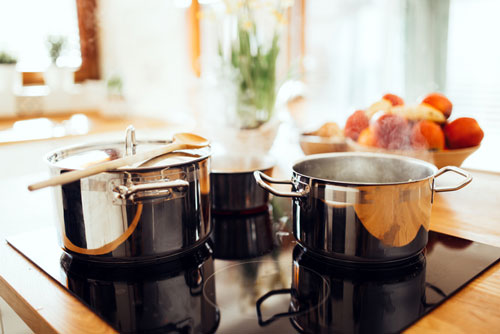Teflon used to contain perfluorooctanoic acid (PFOA). This chemical was tied to kidney disease, liver disease, thyroid disorders, testicular cancer, and other serious illnesses.1
In 2013, PFOA was phased out. The new Teflon formulation was supposed to be safer.
A new study shows it may be just as dangerous.
A recent draft report from the Environmental Protection Agency looked at compounds called PFAS. They have replaced PFOA and are now used in Teflon and other chemical non-stick coatings.2
The EPA findings are alarming.
One PFAS that’s now widely used in cookware is called “GenX.” It was developed by the giant chemical company DuPont.
The EPA says data from animal studies on GenX “are suggestive of cancer.”
The report also says ingestion of GenX chemicals could affect the immune system, kidneys, blood, and liver.
Professor Lee Ferguson of Duke University is an environmental analytical chemist. He says the report shows “the compounds we’re replacing toxic compounds for are also toxic.”3
Even extremely tiny amounts of the PFAS can be dangerous… just a few hundred parts per trillion.
Open-records laws recently brought to light an email by an unnamed White House official. The official called the nonstick cookware situation “a potential public relations nightmare.”
Government officials are urging the EPA to regulate GenX. But as of yet, there are no federal health guidelines for it.
5 Safe Cookware Materials
Stay away from pots and pans with chemical nonstick coatings. We don’t yet know exactly how dangerous they are, but the EPA report makes it clear that they may be no better than older generation coatings. And since there are plenty of cookware alternatives, there’s no reason to take chances. Here are five cookware materials that won’t harm your health:
- Cast iron: It’s inexpensive, versatile, easy to clean, and virtually indestructible. It may leach small amounts of iron into foods, but for most of us, this is not a problem.4
- Enamel-covered cast iron: It is nonreactive and holds heat well. Le Creuset is the best-known brand. But it is expensive. Lower-priced brands have become widely available in recent years.5
- Ceramic and stoneware: These are good for baking. They are great at distributing heat and cooking evenly. But be sure to get unglazed versions. Glazes can contain lead and other contaminants. Their only downside is that they can break if you drop them.6
- Stainless steel: It can be expensive. But it is nonreactive. You can cook acidic and alkaline foods in stainless without worrying about chemicals leaching out of the cookware.
- Glass: It’s primarily used for pots, not skillets. But glass also makes good baking pans, pie pans, and casserole dishes. It’s completely nonreactive. One downside is that if you put something cold into hot glass cookware, the glass can break. Pay attention to temperature shifts when using it.
In addition to avoiding cookware with chemical nonstick coatings, you should stay away from aluminum. It’s been linked to cognitive problems.
One more thing… You can make your cookware less sticky (and your food healthier) by using generous amounts of extra virgin olive oil while sautéing.
Editor’s Note: A small group of holistic doctors were quietly discovering cancer breakthroughs. Then, when word of their effective therapies started getting out, something terrible started happening… The doctors started disappearing.
Get all the details HERE.
Related Articles
Simple Eating Trick to Prevent Cancer
One Vitamin Cuts Breast Cancer Risk by 80%
Big Pharma’s Heartless Cancer Drug Price Gouge
Like this Article? Forward this article here or Share on Facebook.
References:
1 https://www.healthline.com/nutrition/nonstick-cookware-safety#section2
2 https://www.epa.gov/pfas/genx-and-pfbs-draft-toxicity-assessments
3 https://apnews.com/fd5a769eb0324980a94580814581a373
4 https://www.ecowatch.com/5-non-stick-pans-that-wont-give-you-cancer-1882169178.html
5 https://www.drkarafitzgerald.com/2017/07/10/safest-cookware-choices-for-your-family/
6 https://wellnessmama.com/5148/safest-cookware-options/

